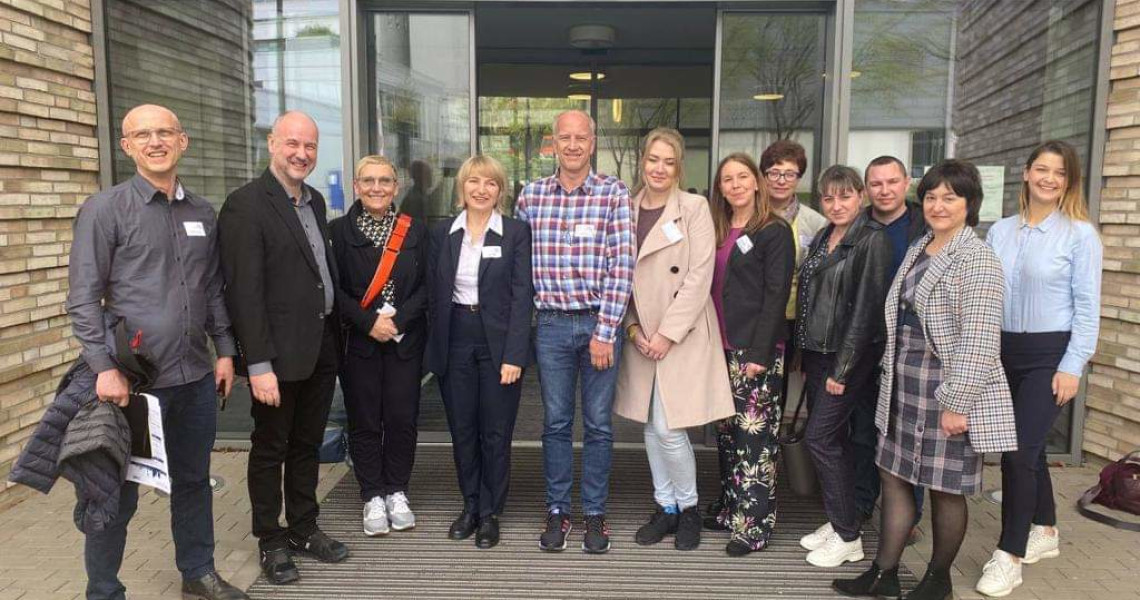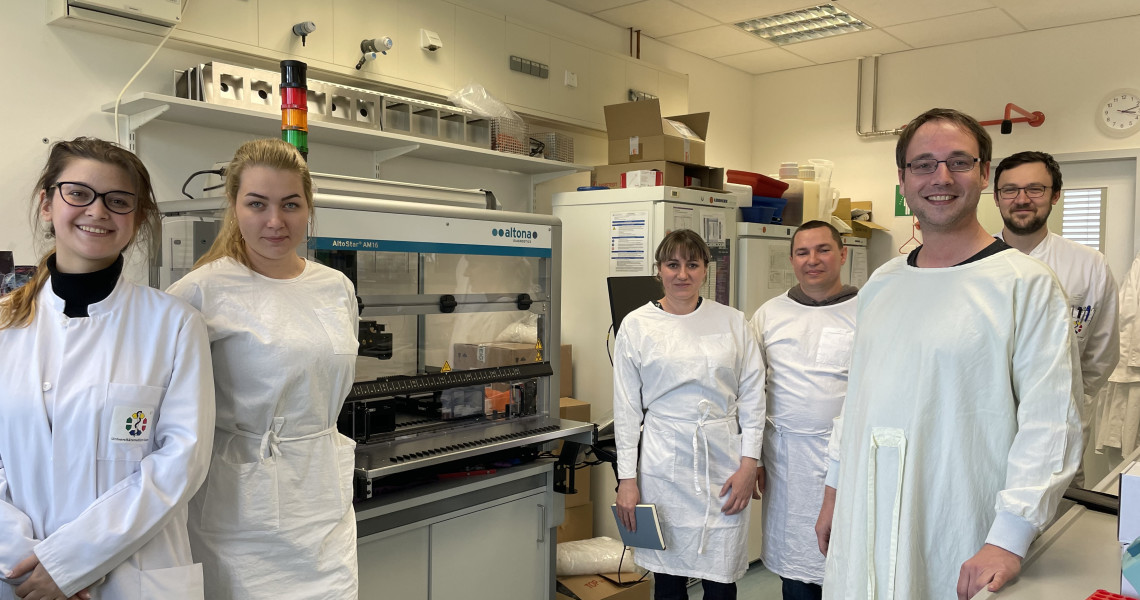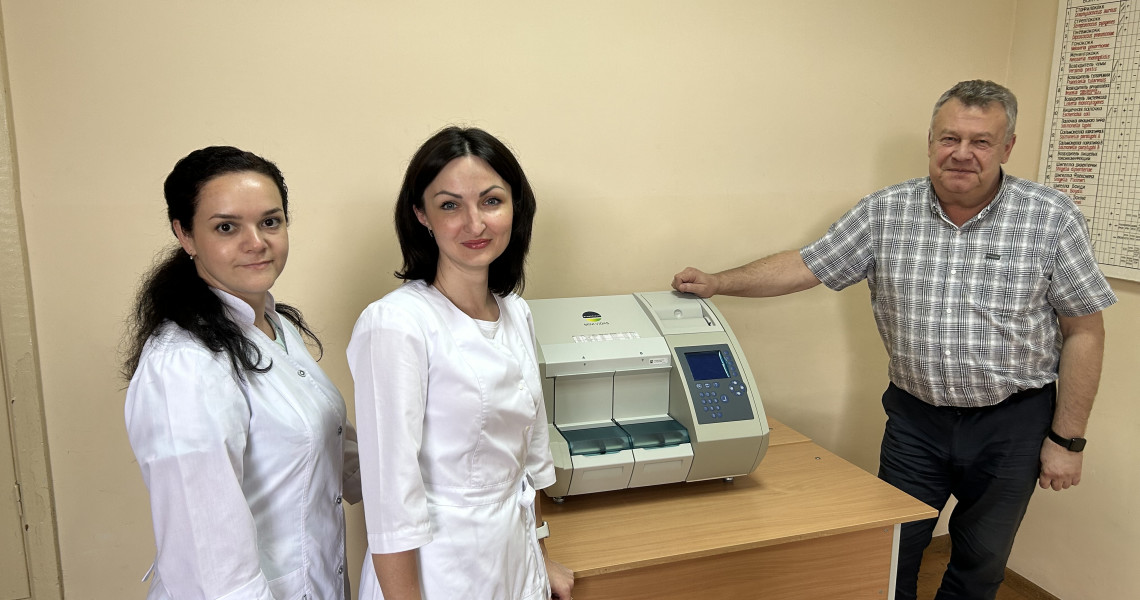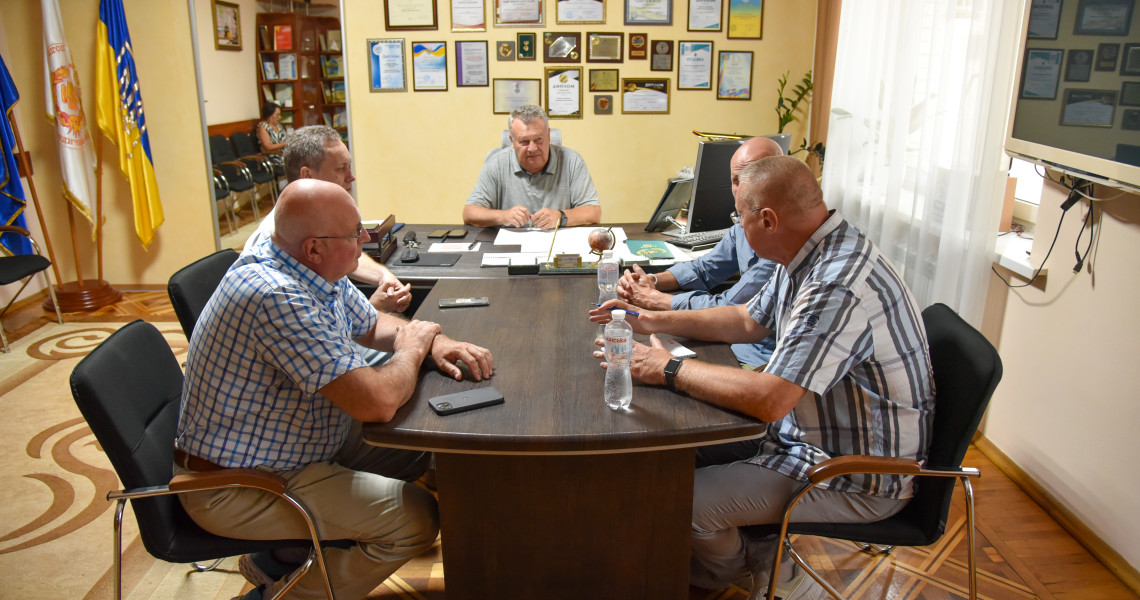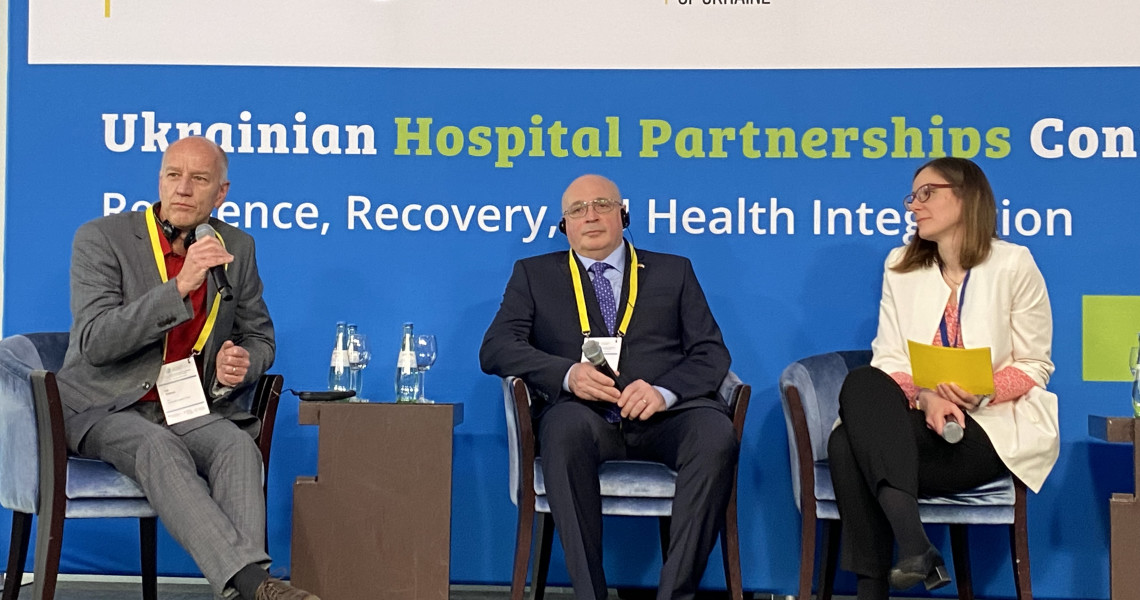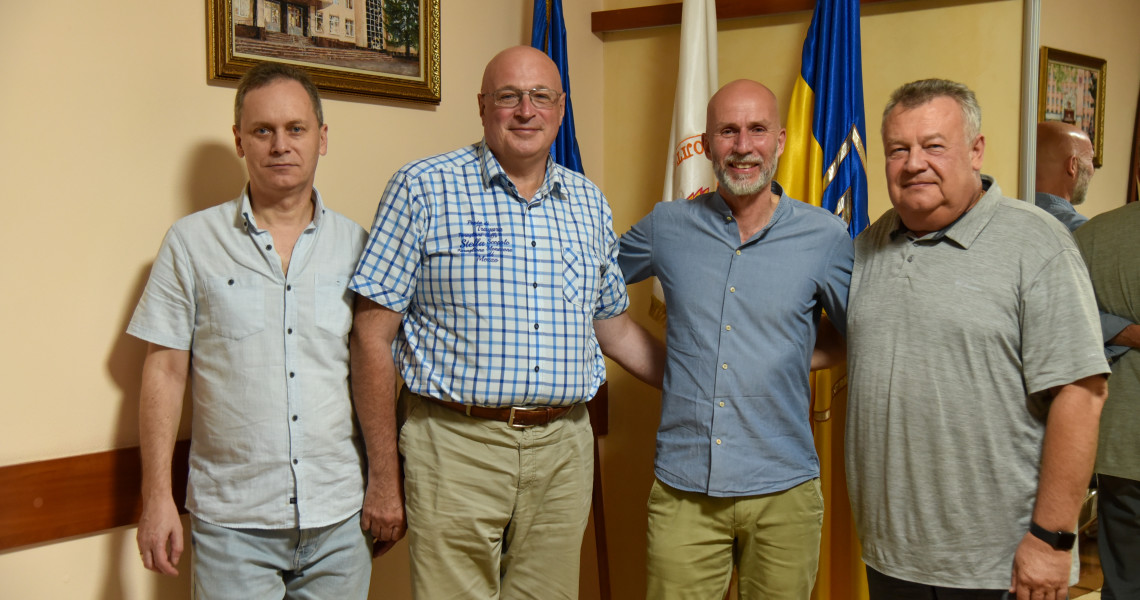Amid armed aggression, ensuring effective diagnosis and treatment of infectious diseases has become an extremely pressing task for the entire healthcare system. This is particularly relevant for the Poltava region, which experiences the broader impact of military actions. Complicated logistics, a growing number of internally displaced persons, and limited access to modern equipment and reagents create additional challenges for medical professionals. Under such conditions, international cooperation, particularly partnerships with European clinics and research centers, comes to the forefront. Programs initiated with the support of the German Society for International Cooperation (GIZ) provide a unique opportunity to access modern diagnostic technologies and methodologies, exchange experiences, and lay the groundwork for the sustainable development of Ukraine’s medical sector, even during crises. The expertise of German specialists, advanced laboratory research techniques, and scientific innovations enable faster and more accurate identification of infectious agents, optimizing approaches to treatment and prevention. International collaboration projects serve as a "bridge" that helps transform wartime challenges into an impetus for reforms and improvements in the national healthcare system.
Within the framework of the international Hospital Partnership Program, "Emergency Measures in Infectious Disease Diagnostics," proposed by GIZ, a grant was obtained to supply diagnostic equipment for infectious disease detection in the Poltava region. On the German side, the project was actively developed by Professor Ulf Dittmer, Director of the Institute of Virology, Gennadiy Zelinsky, and project coordinator Ursula Schrammel. On the Ukrainian side, Professors Ihor Kaidashev, Tetiana Koval, and Iryna Shkurupii coordinated the project. The result was a cooperation agreement signed by the Rectors of the University of Duisburg-Essen, Professor Barbara Albert, and Poltava State Medical University, Professor Viacheslav Zhdan, as well as Essen University Hospital leadership, represented by Thorsten Kaatze. (Photo 1 – Initiation of cooperation between the universities).
Particular attention within international programs is paid to the practical training of infectious disease physicians, microbiologists, and other specialists directly involved in diagnosing infectious diseases. Access to the cutting-edge laboratory technologies, learning new research methods, and becoming familiar with international diagnostic and treatment protocols provide opportunities for rapid professional growth. Traineeships at European university hospitals, such as the Institute of Virology at Essen Medical University, allow Ukrainian specialists to work with state-of-the-art equipment, ensuring automatic identification of pathogens, determining their antimicrobial sensitivity, and conducting precise PCR diagnostics. This involves not only technical aspects—international experience teaches systemic approaches, precision, teamwork, and the ability to adapt quickly to new conditions and implement gained knowledge into daily practice. Thus, after training abroad, physicians and scientists return to Ukraine with invaluable skills that improve the quality of medical services for the population and facilitate effective responses to infectious disease challenges during difficult times. (Photo 2 – Group of Poltava scientists and physicians undergoing training in Germany).
In April 2023, the first visit of PSMU staff, including Tetiana Koval, Head of the Department of Infectious Diseases and Epidemiology, Alina Kabalei, Junior Researcher of the Research Institute, and employees of the CE “Poltava Regional Clinical Infectious Disease Hospital of PCC”, took place at Essen Medical University. During the visit, the physicians familiarized themselves with the work of the Institute of Virology laboratories and participated in the "HIV Immunology, Vaccine Research and Treatment Symposium." (Photo 3 – Reports in the German press on the visit of scientists and physicians from Poltava).
In May 2023, as part of the Program, a second training cycle on "Microbiological Diagnostics" took place. Assistant Olena Marchenko and colleagues from the CE “Poltava Regional Clinical Infectious Disease Hospital of PCC”studied microbiological diagnostic methods, protocols, and automated equipment for identifying pathogens and PCR diagnostics. In August-September 2023, the first immunofluorescent research equipment, MiniVidas, and the microbiological analyzer VITEK 2 were delivered to PSMU and the hospital. Further high-tech PCR labs and additional equipment were later acquired. (Photo 4 – Delivery of equipment for serological diagnostics).
Grants from respected international organizations allow Ukrainian medical institutions, universities, and research centers to overcome financial barriers, implement high-tech solutions, and strengthen their scientific and technical foundations. The GIZ initiative and support from German partners, particularly Essen University Hospital, exemplify successful partnerships. This collaboration has equipped laboratories at Poltava State Medical University and the CE “Poltava Regional Clinical Infectious Disease Hospital of PCC” with essential tools for precise infectious disease diagnostics, including PCR systems, serological analyzers, automated platforms, and training sessions on their use.
On February 26-27, 2024, a conference of the German Society for International Cooperation (GIZ) took place in Berlin, supporting Ukraine on behalf of the German Federal Government. The conference, "Ukrainian Hospital Partnerships Conference - Resilience, Recovery EU Health Integration" was attended by representatives of Ukraine's Ministry of Health, scientists from Poltava State Medical University — Professors Ihor Kaidashev, Tetiana Koval — and partners from the CE “Poltava Regional Clinical Infectious Disease Hospital of PCC”, including Liudmyla Voloshyna. (Photo 5 – Presentation by Professors Ulf Dittmer and Ihor Kaidashev on the positive outcomes of the partnership in Berlin, 2024).
Together with German colleagues from the University Hospital Essen — Professors Ulf Dittmer, Evelyn Heintschel von Heinegg, Mirko Trilling, Hennadii Zelinskyi, and Ursula Schrammel — preliminary results of the project “Improving the Diagnosis of Infectious Diseases” in the Poltava region were presented.
The project included staff training at the University Hospital Essen, the selection and procurement of equipment and reagents, their transportation to Ukraine, and the organization of technical servicing. During the discussion, the achievements of cooperation between the hospitals and the university were analyzed, and further collaboration and its expansion were outlined. In his speech, Ihor Kaidashev emphasized that the exceptionally effective implementation of the project was due to the extensive experience of colleagues from the University Hospital Essen, the active and informal assistance of GIZ, and the unique synergistic environment built by Poltava State Medical University and the healthcare institutions of the Poltava region.
It is particularly important to emphasize the significance of the healthcare partnership between Ukraine and Germany, which holds strategic value not only for addressing current medical challenges but also for the future recovery and integration of Ukraine into the European space. The conference of the German Society for International Cooperation (GIZ), held in February 2024 in Berlin, served as a vivid example of how multilateral dialogue, the presentation of achieved results, and discussions of prospects and challenges create a shared space for building the resilience of the healthcare system. This resilience is manifested not only in the ability of medical institutions and universities to cope with emergencies (such as military actions or pandemics) but also in their capacity to recover, update their material and technical base, enhance staff qualifications, implement new standards, and manage resources with maximum efficiency.
The participation of representatives from the Ministry of Health of Ukraine, Poltava State Medical University, specialists from the CE “Poltava Regional Clinical Infectious Disease Hospital of PCC”, and their German colleagues from the University Hospital Essen, as well as other partners, demonstrated that international dialogue is not merely a formality. On the contrary, it serves as a platform for the development of concrete projects that are already improving the quality of diagnostics, optimizing treatment protocols, and making healthcare more open to innovation.
On July 23, 2024, the Program Director of the German Society for International Cooperation (GIZ) GmbH, Dr. Anselm Schneider, visited Poltava State Medical University. During a meeting with the delegation, PSMU Rector, Professor Viacheslav Zhdan, discussed key aspects of scientific collaboration within the framework of the Hospital Partnerships Program. Dr. Schneider shared his vision for establishing a university clinic in Ukraine, particularly in Poltava, based on the experience of German university hospitals. Given that M. Sklifosovskyi Poltava Regional Clinical Hospital and Poltava State Medical University are actively collaborating in this area, the expertise of German colleagues could prove highly beneficial. "Out of 53 university departments, 48 are clinical! And they are all based in clinics—this is a unified and powerful team of scientists and practitioners," noted Rector Viacheslav Zhdan to the German colleagues, highlighting the existing groundwork that strongly supports implementing the progressive concept of a university clinic. "Our medical system has always gravitated toward the German model, and we are among the few countries that have retained the two-tier German system of academic training, namely, the defense and attainment of the Doctor of Philosophy and Doctor of Science degrees," emphasized Vice-Rector for Research, Ihor Kaidashev. "Thus, returning to the German models of scientific and practical education today would be very natural!" (Photos 6, 7: Meeting between Dr. Anselm Schneider and PSMU Rector Professor Viacheslav Zhdan.)
On August 25, 2024, Dr. Hennadii Zelinskyi visited Poltava State Medical University to personally oversee the delivery of test systems for diagnostic equipment. During his visit, Dr. Zelinskyi toured the Research Institute of Genetic and Immunological Foundations of Pathology Development and Pharmacogenetics at PSMU and the CE “Poltava Regional Clinical Infectious Disease Hospital of PCC”. During a meeting with Professor Ihor Kaidashev Vice-Rector for Research; Professor Tetiana Koval; Oksana Shlykova, Director of the Research Institute, Alina Kabalei, Junior Researcher, and Mykhailo Sydorenko, Head of the Laboratory at the CE “Poltava Regional Clinical Infectious Disease Hospital of PCC”, the participants discussed directions for future scientific collaboration and the next deliveries of laboratory equipment for diagnosing infectious diseases in the region. (Photos 10, 11, 12: Visit of Hennadii Zelinskyi for the delivery of equipment and reagents.)
Since March 2024, the implementation of new equipment for serological, microbiological, and PCR diagnostics has begun at the CE “Poltava Regional Clinical Infectious Disease Hospital of PCC”. Over this period, a large number of tests have been conducted for patients undergoing inpatient treatment for infectious diseases. Specifically, more than 600 tests have been performed for HIV infection, viral hepatitis A, B, and C, with the introduction of serological testing for toxoplasmosis and Lyme disease. Microbiological testing has also commenced with the use of a new device equipped with a semi-automated system, allowing for improved research quality and more efficient evaluation of pathogen sensitivity to antibiotics. Starting in October 2024, PCR testing has been conducted, including for viral hepatitis B and C, herpes infections, adeno- and noroviruses, and others.
Grants and partnership projects facilitate the development of long-term relationships between Ukrainian and foreign hospitals, higher medical education institutions, and research institutes. This means Ukrainian physicians have the opportunity not only to enhance their professional skills but also to participate in international research initiatives, exchange experiences, and engage in multilateral conferences and symposia. This “chain” of collaboration, strengthened by grant support, forms a solid foundation for building a strong medical community capable of promptly responding to current challenges and accessing new opportunities for advancing medicine in Ukraine. Successful cooperation continues with the next steps, including joint scientific projects on issues such as the impact of stress on military personnel and civilians due to the war in Ukraine, focusing on changes in the immune system and the reactivation of herpesvirus infections.
The sustainable development of the medical sector in Ukraine, its gradual harmonization with European standards, and inclusion in the EU's common scientific and medical space also bring the country closer to future EU membership. The successes in diagnosing and treating infectious diseases further prove that integration into the European community is not merely a political or economic goal. It is also an opportunity to provide citizens with better healthcare, innovative solutions, professional development, and a higher level of health security. Collaboration with Germany and other European partners demonstrates that the medical field can serve as a bridge toward deeper integration, peace, and prosperity, even amid significant historical challenges. Thus, GIZ's international initiatives and cooperation between clinics, universities, institutes, and specialists from both countries are not merely isolated episodes of collaboration but part of a strategy for sustainable development and alignment with the European community. And in December 2024, a new scientific-practical project was launched by an international team of scientists from partner universities.






